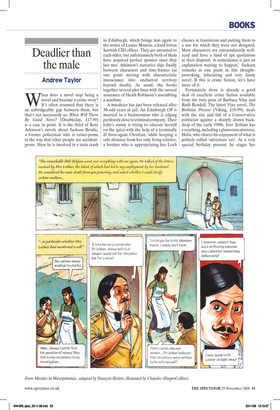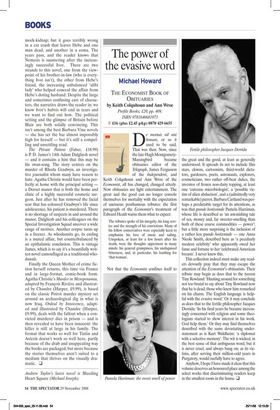Deadlier than the male
Andrew Taylor
When does a novel stop being a novel and become a crime story? It’s often assumed that there is an unbridgeable gap between them, but that’s not necessarily so. When Will There Be Good News? (Doubleday, £17.99) is a case in point. It is the third of Kate Atkinson’s novels about Jackson Brodie, a former policeman who is crime-prone in the way that other people are accidentprone. Here he is involved in a train crash in Edinburgh, which brings him again to the notice of Louise Monroe, a hard-bitten Scottish CID officer. They are attracted to each other, but unfortunately both of them have acquired perfect spouses since they last met. Atkinson’s narrative slips fluidly between characters and time-frames (at one point moving with characteristic insouciance into uncharted territory beyond death). As usual, she hooks together several plot lines with the surreal assurance of Heath Robinson’s assembling a machine.
A murderer has just been released after 30-odd years in jail. An Edinburgh GP is married to a businessman who is edging perilously close to criminal company. Their baby’s nanny is trying to educate herself on the quiet with the help of a terminally ill born-again Christian, while keeping a safe distance from her only living relative, a brother who is appropriating her Loeb classics in translation and putting them to a use for which they were not designed. Most characters are extraordinarily wellread and have a fund of apt quotations at their disposal. ‘A coincidence is just an explanation waiting to happen,’ Jackson remarks at one point in this thoughtprovoking, infuriating and very funny novel. If this is crime fiction, let’s have more of it.
Fortunately there is already a good deal of excellent crime fiction available from the twin pens of Barbara Vine and Ruth Rendell. The latest Vine novel, The Birthday Present (Viking, £18.99), deals with the rise and fall of a Conservative politician against a sharply drawn backdrop of the early 1990s. Ivor Tesham has everything, including a glamorous mistress, Hebe, who shares his enjoyment of what is politely called ‘adventure sex’. As a very special birthday present, he stages her mock-kidnap; but it goes terribly wrong in a car crash that leaves Hebe and one man dead, and another in a coma. The years pass, and the reader knows that Nemesis is sauntering after the increasingly successful Ivor. There are two strands to this novel, one from the viewpoint of his brother-in-law (who is everything Ivor isn’t), the other from Hebe’s friend, the increasing unbalanced ‘alibi lady’ who helped conceal the affair from Hebe’s doting husband. Despite the large and sometimes confusing cast of characters, the narrative draws the reader in: we know Ivor’s hubris will end in tears and we want to find out how. The political setting and the glimpse of Britain before Blair are both solidly convincing. This isn’t among the best Barbara Vine novels — she has set the bar almost impossibly high for herself — but it’s still a compelling and unsettling read.
The Private Patient (Faber, £18.99) is P. D. James’s 14th Adam Dalgliesh novel — and it contains a hint that this may be his swan-song. The story centres on the murder of Rhoda Gradwyn, an investigative journalist whom many have reason to hate. Agatha Christie would have been perfectly at home with the principal setting — a Dorset manor that is both the home and clinic of a highly successful cosmetic surgeon. Just after he has removed the facial scar that has coloured Gradwyn’s life since adolescence, his patient is murdered. There is no shortage of suspects in and around the manor. Dalgliesh and his colleagues on the Special Investigation Squad uncover a wide range of motives. Another corpse turns up in a freezer. As whodunnits go, its ending is a muted affair, but counterbalanced by an epithalamic conclusion. This is vintage James, which is to say it’s a beautifully written novel camouflaged as a traditional whodunnit.
Finally the Queen Mother of crime fiction herself returns, this time via France and in large-format, comic-book form. Agatha Christie’s Murder in Mesopotamia, adapted by François Rivière and illustrated by Chandre (Harper, £9.99), is based on the classic Poirot murder mystery set around an archaeological dig in what is now Iraq. Ordeal by Innocence, adapted and illustrated by Chandre (Harper, £9.99), deals with the fallout when a convicted murderer dies in prison — and is then revealed to have been innocent: the killer is still at large in his family. The format that works so well for Tintin and Asterix doesn’t work so well here, partly because of the drab and unappealing way the books are packaged, but more because the stories themselves aren’t suited to a medium that thrives on the visually dramatic. ❑ Andrew Taylor’s latest novel is Bleeding Heart Square (Michael Joseph).



































































































 Previous page
Previous page